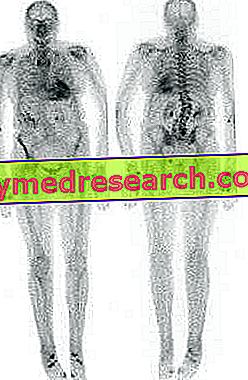Generality
Nausea is a symptom that consists of a feeling of sickness in the upper part of the stomach; this discomfort can spread to the chest or back of the throat and is often associated with a sense of vomiting.
The causes of nausea are numerous.

Nausea should raise concerns when it is associated with: head trauma, headache, severe abdominal pain, etc.
Only an adequate diagnosis makes it possible to establish the correct treatment; treatment that depends on the severity of the symptoms and the causes.
What is nausea?
Nausea is a general medical term that describes a malaise in the upper part of the stomach, very often accompanied by a particular sense of vomiting .
Nausea is a symptom and not a condition; it is very common and characterizes a large number of diseases.
The sense of vomiting, which accompanies most episodes of nausea, may remain so or may result in actual vomiting .
Causes
Nausea can be the result of problems concerning:
- Abdominal or pelvic organs .
The most common abdominal or pelvic conditions, capable of inducing nausea, are: hepatitis (inflammation of the liver), pancreatitis (inflammation of the pancreas), intestinal obstruction, gastric volvulus, gastroesophageal reflux disease, a state of constipation, gastritis, appendicitis, colitis, gastroenteritis, pyelonephritis (inflammation of the kidneys), kidney failure and diseases of the gall bladder.
This category also includes episodes of nausea caused, in women, by menstruation.
- The brain, the cerebrospinal fluid (or cerebrospinal fluid or CSF) and the nervous system in general
Problems that affect the nervous system and can cause nausea are: migraine, head trauma, brain tumors, stroke, cerebral haemorrhages, meningitis (inflammation of the meninges) and damage to the optic nerve responsible for glaucoma .
This category also includes episodes of nausea triggered by some odors or some visions: even in these situations, in fact, the nausea has a nervous origin.
- The centers of the balance of the inner ear .
Generally, vertigo results from dysfunction of the inner ear balance centers. The presence of vertigo produces, in the affected person, the feeling that the surrounding environment is moving or rotating.
Nausea is a very common symptom of accompanying vertigo.
The conditions that most commonly cause vertigo are: benign paroxysmal positional vertigo (BPPV), labyrinthitis, vestibular neuronitis, Ménière's syndrome and motion sickness.
Nausea is also a common side effect of those biochemical changes induced in the human body by:
- Female reproductive hormones, during pregnancy or during periods of use of the contraceptive pill. According to some clinical investigations, about 50% of pregnant women suffer from morning sickness during the first months of pregnancy.
- Some pharmacological substances . The most well-known drugs that have nausea among the side effects are chemotherapy and antidepressants.
- A state of hypoglycemia . Hypoglycemia is the medical term that indicates a blood glucose level below normal parameters.
- Alcohol abuse . Nausea is a typical sign of alcohol intoxication.
- General anesthesia . Upon awakening from general anesthesia, an individual may experience various sensations, such as confusion, dizziness, weakness and even nausea.
- Some food allergies .
Associated symptoms
To learn more: Nausea - Causes and Symptoms
There are many descriptions of nausea.
For some, it is a malaise that starts from the stomach and rises to the back of the throat; for someone else, it is an unpleasant sensation felt between the stomach and the chest.
The symptoms and signs that can accompany nausea are numerous. We have already spoken of the sense of vomiting and vomiting: these two are the main accompanying disorders.
Two other clinical manifestations that are often associated with nausea are disgust for food and profuse sweating : the first is typical of episodes of nausea caused by abdominal or pelvic conditions; the second one, instead, is typical of the episodes of nausea following problems of the centers of the equilibrium (ex: chinetosis).
DURATION OF THE SENSE OF NAUSEA
The duration of the feeling of nausea varies according to the triggering condition.
For example, episodes of motion sickness or the most common viral diseases affecting the gastrointestinal system (gastroenteritis, etc.) produce short-term nausea.
Conversely, a serious problem, such as brain tumors, migraine headaches or trauma, can cause recurrent nausea.

HE RETCHED
In the body of an individual who is about to vomit, it happens that:
- The cardia, which is the muscular ring located between the esophagus and the stomach, relaxes. The cardia is also known as the upper esophageal sphincter;
- The abdominal muscles and the diaphragm contract;
- The larynx closes;
- The lower portion of the stomach contracts.
With vomiting, the victim's subject expels the gastric contents, first through the esophagus and then through the mouth.
WHEN TO REFER TO THE DOCTOR?
The presence of nausea assumes a significant clinical importance, when it is:
- Following a head injury;
- Associated with severe headaches;
- Associated with severe abdominal pain;
- Accompanied by vomiting with blood;
- Combined with extreme weakness;
- Combined with high fever;
- Associated with blurred vision or eye pain;
- Accompanied by confusion or stiffness in the neck.
Diagnosis
Nausea is a very non-specific symptom that, as readers will certainly have noticed, can characterize serious and less serious conditions.
Understanding the triggering causes is the fundamental step to interpret its severity and to establish the most appropriate therapy.
When dealing with an individual who complains of nausea, doctors generally begin diagnostic investigations with physical examination and medical history. Already from an accurate physical examination and a careful anamnesis, I am able to understand if the problem deserves further investigations (because relevant from the clinical point of view) or if it is a passing malaise (therefore negligible).
Possible examinations include: blood tests, a pregnancy test (in the case of female patients) and a nuclear magnetic resonance or a head CT scan.
OBJECTIVE AND ANAMNESIS EXAMINATION
The physical examination is the set of diagnostic maneuvers, carried out by the doctor, to verify the presence or absence, in the patient, of signs indicative of an abnormal condition. Often, it also includes the measurement of vital signs, ie: body temperature, pressure, heart rate, etc.
The anamnesis is the critical collection and study of symptoms and facts of medical interest, reported by the patient or his family members.
Treatment
To learn more: Drugs for Nausea Care
The treatment of nausea depends on how severe the feeling of discomfort is and the type of triggers.
As a rule, episodes of mild nausea and of little clinical interest do not require particular therapies, at most they resort to simple remedies or over-the-counter medicines that prevent or limit the problem.
On the contrary, episodes of intense nausea of significant medical interest may require specific anti-nausea drugs and, sometimes, even surgical procedures .
SOME REMEDIES AND MEDICINALS FOR LESS SERIOUS CASES
To remedy the nausea induced by minor problems in the abdominal or pelvic organs, doctors recommend:
- Drink drinks that "fix" and regulate the stomach, such as chamomile.
- Avoid caffeinated beverages, coffee or tea.
- Feed on small, but frequent meals. In this way, the digestive process is less "demanding" for the stomach.
- Eat easily digestible foods (so avoid foods high in fat).
- Avoid spicy foods and fried foods.
With regard to over-the-counter medicines suitable for less severe cases of nausea, they deserve a special mention:
- Antacids in chewable or liquid tablets, bismuth subsalicylate and glucose, fructose and phosphoric acid solutions. They are mainly used to buffer excessive stomach acid.
- Dimenhydrinate and meclizine hydrochloride. They are used for the treatment and prevention of motion sickness. Furthermore, they block the brain receptors involved in the mechanism of motion sickness.
As for herbal remedies for nausea, readers can consult the article here.
Read also: Remedies for Nausea »
ANTI-NAUSEA DRUGS
Anti-nausea drugs are indicated in the presence of an intense and persistent feeling of nausea.
These medicines have different side effects, the main one being drowsiness.
As a rule, doctors forbid their use to women who are pregnant or for whom there is a suspicion that they are pregnant.
- To learn more about "anti-nausea drugs", readers can consult the article here.
- For medicinal alternatives that can be used during pregnancy, readers can consult the article here.
SURGERY: WHEN CAN YOU SERVE?
Surgical practice is indispensable in the presence of serious conditions such as malignant brain tumors, acoustic neuroma (which is a benign brain tumor), intestinal obstructions, episodes of gastric volvulus, etc.
In such circumstances, nausea is only one of many symptoms present.
Prognosis
The prognosis in case of nausea depends on the causes of the illness.
If the causes are of little relevance from the clinical point of view, the nausea has a positive prognosis and healing usually takes place within 24-48 hours.
Prevention
Not all causes of nausea are preventable.
Next, the reader will be able to consult a series of preventive advice, valid for cases of nausea due to minor abdominal or pelvic problems and to cases of nausea due to motion sickness:
- Eat lots of small snacks, instead of a few and abundant meals. In this way, digestion is easier;
- Avoid eating poorly preserved and bad-looking foods;
- Avoid alcoholic beverages;
- Write down which foods have triggered particularly intense episodes of nausea; therefore, avoid them in the future;
- If you suffer from motion sickness, in the car it is good to avoid reading and sitting in the central positions (the side seats are less annoying).
Before taking any anti-nausea medication against motion sickness, you should consult your doctor.
To learn more, consult the special: Car sickness and movement-related disorders: what to do to prevent them



